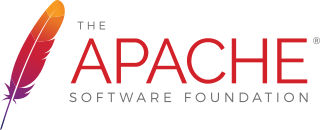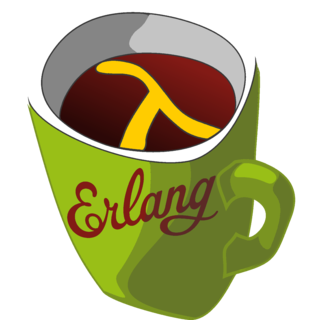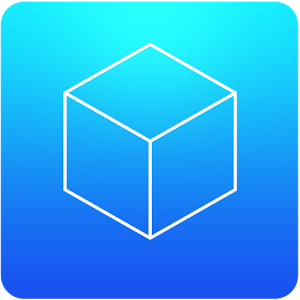
Erlang is a general-purpose, concurrent, functional high-level programming language, and a garbage-collected runtime system. The term Erlang is used interchangeably with Erlang/OTP, or Open Telecom Platform (OTP), which consists of the Erlang runtime system, several ready-to-use components (OTP) mainly written in Erlang, and a set of design principles for Erlang programs.

The GNU Lesser General Public License (LGPL) is a free-software license published by the Free Software Foundation (FSF). The license allows developers and companies to use and integrate a software component released under the LGPL into their own software without being required by the terms of a strong copyleft license to release the source code of their own components. However, any developer who modifies an LGPL-covered component is required to make their modified version available under the same LGPL license. For proprietary software, code under the LGPL is usually used in the form of a shared library, so that there is a clear separation between the proprietary and LGPL components. The LGPL is primarily used for software libraries, although it is also used by some stand-alone applications.

The Apache License is a permissive free software license written by the Apache Software Foundation (ASF). It allows users to use the software for any purpose, to distribute it, to modify it, and to distribute modified versions of the software under the terms of the license, without concern for royalties. The ASF and its projects release their software products under the Apache License. The license is also used by many non-ASF projects.
The Mozilla Public License (MPL) is a free and open-source weak copyleft license for most Mozilla Foundation software such as Firefox and Thunderbird. The MPL license is developed and maintained by Mozilla, which seeks to balance the concerns of both open-source and proprietary developers; it is distinguished from others as a middle ground between the permissive software BSD-style licenses and the General Public License. So under the terms of the MPL, it allows the integration of MPL-licensed code into proprietary codebases, but only on condition those components remain accessible.

ejabberd is an Extensible Messaging and Presence Protocol (XMPP) application server and an MQ Telemetry Transport (MQTT) broker, written mainly in the Erlang programming language. It can run under several Unix-like operating systems such as macOS, Linux, FreeBSD, NetBSD, OpenBSD and OpenSolaris. Additionally, ejabberd can run under Microsoft Windows. The name ejabberd stands for Erlang Jabber Daemon and is written in lowercase only, as is common for daemon software.

SeaMonkey is a free and open-source Internet suite. It is the continuation of the former Mozilla Application Suite, based on the same source code, which itself grew out of Netscape Communicator and formed the base of Netscape 6 and Netscape 7.

Free and open-source software (FOSS) is a term used to refer to groups of software consisting of both free software and open-source software, where anyone is freely licensed to use, copy, study, and change the software in any way, and the source code is publicly available so that people are encouraged to improve the design of the software. This is in contrast to proprietary software, where the software is under restrictive copyright or licensing and the source code is hidden from the users.

The Eclipse Public License (EPL) is a free and open source software license most notably used for the Eclipse IDE and other projects by the Eclipse Foundation. It replaces the Common Public License (CPL) and removes certain terms relating to litigations related to patents.

Mnesia is a distributed, soft real-time database management system written in the Erlang programming language. It is distributed as part of the Open Telecom Platform.

Yaws is a web server written in Erlang by Claes (klacke) Wikström. Yaws can be embedded into other Erlang-based applications or run as a regular standalone web server.

A free-software license is a notice that grants the recipient of a piece of software extensive rights to modify and redistribute that software. These actions are usually prohibited by copyright law, but the rights-holder of a piece of software can remove these restrictions by accompanying the software with a software license which grants the recipient these rights. Software using such a license is free software as conferred by the copyright holder. Free-software licenses are applied to software in source code and also binary object-code form, as the copyright law recognizes both forms.

Copyleft is the legal technique of granting certain freedoms over copies of copyrighted works with the requirement that the same rights be preserved in derivative works. In this sense, freedoms refers to the use of the work for any purpose, and the ability to modify, copy, share, and redistribute the work, with or without a fee. Licenses which implement copyleft can be used to maintain copyright conditions for works ranging from computer software, to documents, art, scientific discoveries and even certain patents.

The GNU General Public License is a series of widely used free software licenses or copyleft that guarantee end users the four freedoms to run, study, share, and modify the software. The license was the first copyleft for general use and was originally written by Richard Stallman, the founder of the Free Software Foundation (FSF), for the GNU Project. The license grants the recipients of a computer program the rights of the Free Software Definition. These GPL series are all copyleft licenses, which means that any derivative work must be distributed under the same or equivalent license terms. It is more restrictive than the Lesser General Public License and even further distinct from the more widely used permissive software licenses BSD, MIT, and Apache.

Joseph Leslie Armstrong was a computer scientist working in the area of fault-tolerant distributed systems. He is best known as one of the co-designers of the Erlang programming language.
Progress Chef is a configuration management tool written in Ruby and Erlang. It uses a pure-Ruby, domain-specific language (DSL) for writing system configuration "recipes". Chef is used to streamline the task of configuring and maintaining a company's servers, and can integrate with cloud-based platforms such as Amazon EC2, Google Cloud Platform, Oracle Cloud, OpenStack, IBM Cloud, Microsoft Azure, and Rackspace to automatically provision and configure new machines. Chef contains solutions for both small and large scale systems.
OTP is a collection of useful middleware, libraries, and tools written in the Erlang programming language. It is an integral part of the open-source distribution of Erlang. The name OTP was originally an acronym for Open Telecom Platform, which was a branding attempt before Ericsson released Erlang/OTP as open source. However neither Erlang nor OTP is specific to telecom applications.
Elixir is a functional, concurrent, high-level general-purpose programming language that runs on the BEAM virtual machine, which is also used to implement the Erlang programming language. Elixir builds on top of Erlang and shares the same abstractions for building distributed, fault-tolerant applications. Elixir also provides tooling and an extensible design. The latter is supported by compile-time metaprogramming with macros and polymorphism via protocols.

Lisp Flavored Erlang (LFE) is a functional, concurrent, garbage collected, general-purpose programming language and Lisp dialect built on Core Erlang and the Erlang virtual machine (BEAM). LFE builds on Erlang to provide a Lisp syntax for writing distributed, fault-tolerant, soft real-time, non-stop applications. LFE also extends Erlang to support metaprogramming with Lisp macros and an improved developer experience with a feature-rich read–eval–print loop (REPL). LFE is actively supported on all recent releases of Erlang; the oldest version of Erlang supported is R14.

FreeOTP is a free and open-source software token that can be used for two-factor authentication. It provides implementations of HOTP and TOTP. Tokens can be added by scanning a QR code or by manually entering the token configuration. It is maintained by Red Hat under the Apache 2.0 license, and supports Android and iOS.
BEAM is the virtual machine at the core of the Erlang Open Telecom Platform (OTP). BEAM is part of the Erlang Run-Time System (ERTS), which compiles Erlang source code into bytecode, which is then executed on the BEAM. BEAM bytecode files have the .beam file extension.













